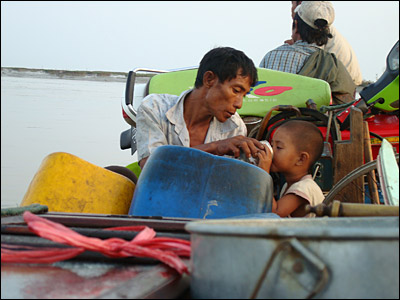UN officials and international aid agencies hope to boost the pace of fund-raising for 2.4 million victims of Cyclone Nargis at a donor conference in Myanmar on 25 May. At the same time, the UN Secretary-General Ban Ki-moon announced that the government had relented on allowing foreign aid workers access to the worst-affected areas.
More than 80,000 people were killed and 50,000 reported missing when the category four storm struck on 2 May, devastating large parts of the Ayeyarwady Delta.
However, three weeks after the disaster, the UN is still struggling to secure the US$201 million it has sought in its flash appeal for 10 UN organisations and nine NGOs to provide food, water, shelter, health kits, cooking sets, mosquito nets, and other relief supplies.
So far, the appeal has received $50.3 million, including $20.4 million from the UN's Central Emergency Response Fund (CERF). Donors have pledged an additional $42.5 million for the appeal.
In total, about $109 million has been given, including cash and supplies given directly to the military government by various countries, global donations to the International Federation of the Red Cross, and contributions by NGOs. In total, $109.9 million has been pledged.
Huge needs
The flow of funds, however, is far short of what is needed.
"It has been fairly slow," said Amanda Pitt, a spokeswoman for the UN Office for the Coordination of Humanitarian Affairs (OCHA).
She expressed hope, however, that the upcoming donor conference, which would be jointly chaired by the UN and the Association of South East Asian Nations (ASEAN), would bolster donors' confidence, especially as the relief effort is gaining momentum.
"What we are hoping will happen in the next few days is that the donors will get a clearer picture and feel more comfortable in committing in greater amounts," Pitt said.
The UN estimates that only a quarter of those in need have so far received
international help.
"There is plenty of money floating around, but it needs to be clearer that the flash appeal can be implemented before people donate," said one UN official, who asked not to be identified.
"We feel we don't know on which basis this appeal has been made," said one
western government official. "Some of us are still waiting for a more complete assessment of the needs before responding to the appeal. We don't really have strong information or strong data on what really are the needs."
 Photo: Wikimedia Commons  |
| The Irrawaddy delta accounted for about 65 percent of Myanmar’s annual rice production. |
granted permission to start using civilian helicopters to ferry food into remote areas. WFP has also expanded its fleet of trucks and boats, which will help step up the pace of aid distribution.
Ban told reporters on 23 May, following his meeting with Myanmar's leader Senior General Than Shwe in the remote capital Naypyidaw, that the contentious issue of international aid workers entering the country had now been resolved. "He has agreed to allow in all the aid workers," Ban said.
Although Myanmar had allowed in some experts from the UN and ASEAN countries
for assessment, the teams did not have free access to the devastated delta region, and were taken only to a handful of carefully controlled sites.
"Relief phase over"
On 22 May, General Thein Sein, the prime minister, told Ban that Myanmar
authorities believed the relief operation was over, and it was time to focus on reconstruction, which they estimate will cost $11.7 billion.
Surin Pitsuwan, the secretary-general of ASEAN - a 10-member regional bloc of which Myanmar is a member - acknowledged the same day that the wide divergence in assessments between government authorities and international aid agencies over conditions on the ground would prove a deterrent to additional fundraising.
ASEAN, which is to play a role coordinating the global aid effort, has called on Myanmar's military leaders to permit a detailed needs assessment, with support from technical experts, hopefully before this weekend's conference.
"The outpouring of goodwill very much depends on the facts and realities that are verifiable," Surin told journalists in Bangkok. "We have to have some form of agreement so this conference will be able to garner assistance based on figures accepted, scrutinised, and validated by competent, objective, neutral agencies."
ak/ds/mw/bp
This article was produced by IRIN News while it was part of the United Nations Office for the Coordination of Humanitarian Affairs. Please send queries on copyright or liability to the UN. For more information: https://shop.un.org/rights-permissions





